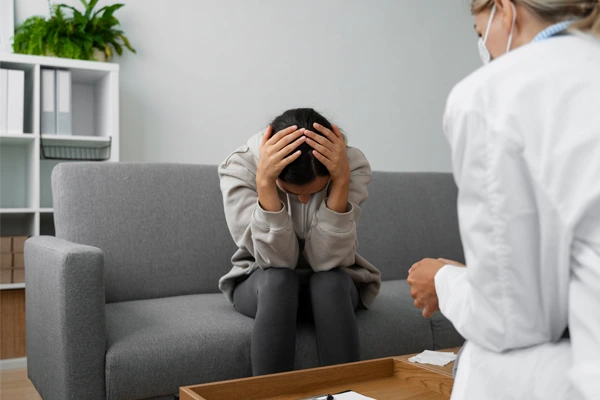PTSD Treatment Center in New Jersey
At Avisa Recovery, we provide compassionate, evidence-based care to help you regain control. Our personalized treatment plans for PTSD offer the tools and support you need to move forward.
Home / Mental Health Treatment / PSTD Trauma

Break Free from the Grip of PTSD
Post-Traumatic Stress Disorder (PTSD) doesn’t just affect the past, it controls the present. The sleepless nights, intrusive thoughts, and overwhelming anxiety can make it feel impossible to live a normal life. But PTSD doesn’t have to define you.
At Avisa Recovery, we specialize in PTSD inpatient treatment, offering a structured environment where healing becomes possible. Whether you or a loved one is struggling, our PTSD treatment provides the support, guidance, and therapeutic care needed for long-term recovery.
Understanding PTSD & Its Impact
PTSD is a mental health condition triggered by a traumatic event. It can develop after experiencing or witnessing distressing situations such as combat, abuse, accidents, or loss. Left untreated, PTSD can disrupt relationships, work, and overall well-being.
Common Symptoms of PTSD:
- Intrusive Thoughts & Flashbacks: Reliving the trauma unexpectedly
- Avoidance Behaviors: Avoiding people, places, or memories that trigger distress
- Emotional Numbness & Detachment: Struggling to connect with loved ones
- Hypervigilance & Anxiety: Always on edge, feeling unsafe in normal situations
- Sleep Disturbances & Nightmares: Insomnia and distressing dreams
Without the right support, PTSD can lead to substance abuse, depression, and other serious mental health struggles. That’s why finding a PTSD treatment center is crucial for long-term healing.

Treatment Plan For PTSD at Avisa Recovery
Healing from PTSD requires a structured, compassionate approach. At Avisa Recovery, our PTSD inpatient treatment program provide a safe space for recovery, focusing on long-term healing and stability.
Trauma-Focused Cognitive Behavioral Therapy (TF-CBT)
TF-CBT helps you process traumatic memories, change negative thought patterns, and regain emotional stability.

How it helps:
- Reduces flashbacks and nightmares
- Helps manage anxiety and emotional distress
- Builds healthier coping mechanisms
Eye Movement Desensitization and Reprocessing (EMDR)
EMDR is a powerful technique that helps rewire the brain’s response to trauma, reducing distressing memories and emotional pain.
- Desensitizes painful memories
- Reduces emotional triggers
- Creates a sense of closure
Medication-Assisted Treatment (If Needed)
For some, PTSD treatment includes medication to stabilize mood, manage anxiety, and improve sleep. Our specialists assess each individual’s needs and provide a tailored approach.
- Eases severe anxiety and panic symptoms
- Improves sleep and emotional regulation
- Supports therapy effectiveness
Mindfulness & Stress Reduction Therapy
Mindfulness helps ground you in the present, reducing PTSD-related anxiety and emotional distress.
How it helps:
- Calms the nervous system
- Increases self-awareness and emotional regulation
- Provides tools to manage triggers in daily life
PTSD Inpatient Treatment for Deep Healing
Sometimes, a structured, immersive environment is necessary for true recovery. Our PTSD inpatient treatment provides:
How it helps:
- Medical and emotional support
- A safe, distraction-free space for healing
- Intensive, personalized therapy sessions
Why Choose Avisa Recovery for PTSD Treatment?
Choosing the right PTSD treatment facility is critical for effective healing. Here’s what sets Avisa Recovery apart:

Expert-Led Trauma Care

Personalized Treatment Plans
No two PTSD cases are the same. We create individualized recovery plans tailored to each person’s unique needs.

A Safe, Supportive Environment
Our PTSD treatment program provides a structured, comforting space for healing, free from everyday stressors.

Comprehensive, Whole-Person Approach
We don’t just treat PTSD symptoms—we focus on mental, emotional, and physical well-being to ensure long-term recovery.
You Deserve to Heal. Take the First Step Now
PTSD does not have to control your life. At Avisa Recovery, we provide expert care to help you heal, rebuild, and move forward. Whether you need PTSD inpatient treatment or specialized therapy, we are here for you.
Find Your Path to Healing
Request a Confidential Callback Now
Get Approved. Get Help.
We Work With Most Major Insurance Providers
- Aetna
- Amerihealth
- Anthem
- Beacon
- Behavioral Health Systems
- BCBS—Most BlueCross & BlueShield Plans
- Carelon Behavioral Health
- CareFirst
- Cigna
- ComPsych
- Coventry
- Empire BlueCross BlueShield
- GHI
- Highmark
- Humana
- Magellan
- MagnaCare
- Meritain Health
- MultPlan
- NYSHIP (New York State Insurance Plan)
- Optum
- Oxford
- PHCS
- Self-Pay
- TRICARE
- UHC
- UMR
- VA Insurance
- 90 Degree Benefits

